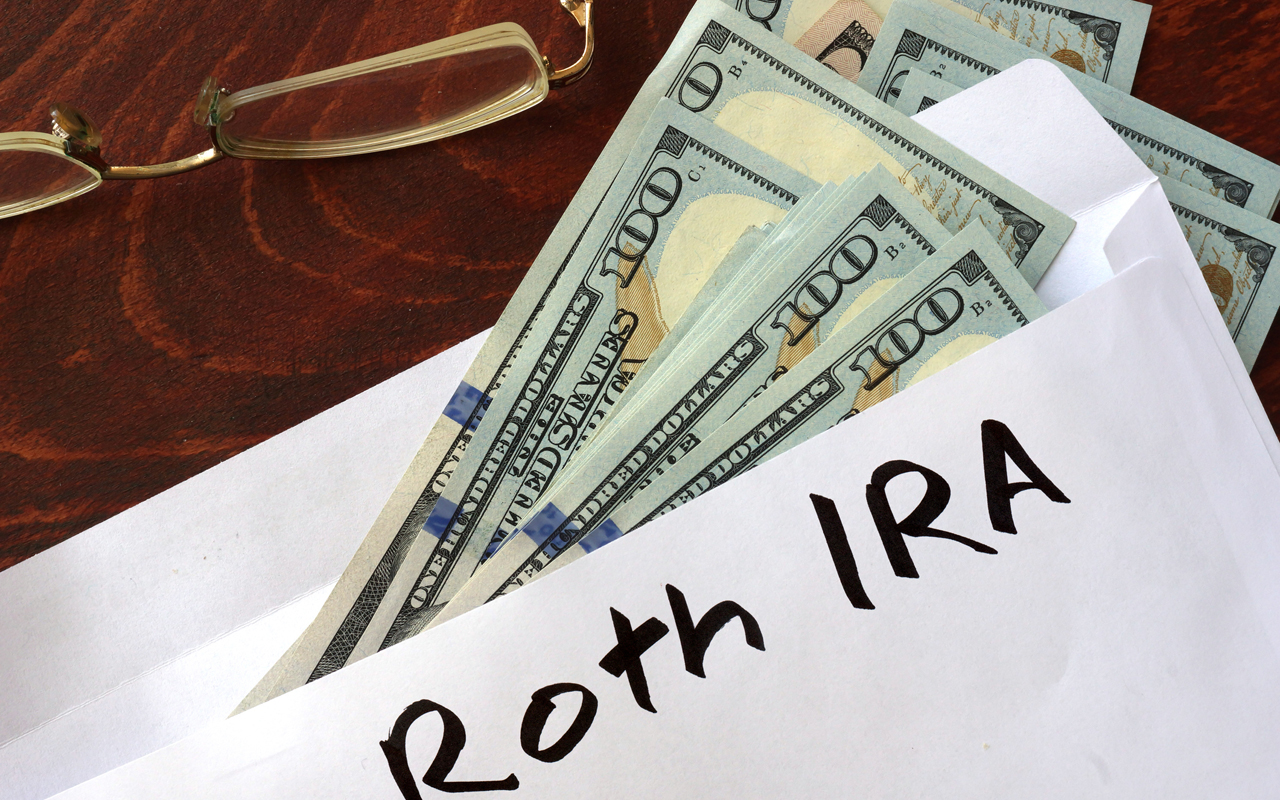10 RMD Mistakes to Avoid
After saving for years in an IRA, 401(k) or other tax-deferred retirement plan, you eventually have to take the money out and pay taxes on it.


Profit and prosper with the best of Kiplinger's advice on investing, taxes, retirement, personal finance and much more. Delivered daily. Enter your email in the box and click Sign Me Up.
You are now subscribed
Your newsletter sign-up was successful
Want to add more newsletters?

Delivered daily
Kiplinger Today
Profit and prosper with the best of Kiplinger's advice on investing, taxes, retirement, personal finance and much more delivered daily. Smart money moves start here.

Sent five days a week
Kiplinger A Step Ahead
Get practical help to make better financial decisions in your everyday life, from spending to savings on top deals.

Delivered daily
Kiplinger Closing Bell
Get today's biggest financial and investing headlines delivered to your inbox every day the U.S. stock market is open.

Sent twice a week
Kiplinger Adviser Intel
Financial pros across the country share best practices and fresh tactics to preserve and grow your wealth.

Delivered weekly
Kiplinger Tax Tips
Trim your federal and state tax bills with practical tax-planning and tax-cutting strategies.

Sent twice a week
Kiplinger Retirement Tips
Your twice-a-week guide to planning and enjoying a financially secure and richly rewarding retirement

Sent bimonthly.
Kiplinger Adviser Angle
Insights for advisers, wealth managers and other financial professionals.

Sent twice a week
Kiplinger Investing Weekly
Your twice-a-week roundup of promising stocks, funds, companies and industries you should consider, ones you should avoid, and why.

Sent weekly for six weeks
Kiplinger Invest for Retirement
Your step-by-step six-part series on how to invest for retirement, from devising a successful strategy to exactly which investments to choose.
After saving for years in an IRA, 401(k) or other tax-deferred retirement plan, you eventually have to take the money out and pay taxes on it. Most people need to start taking these required minimum distributions after they turn age 70½—and the stakes are high. If you don’t take out the required amount by the deadline, you could get hit with a penalty worth up to 50% of the amount you should have withdrawn. It’s easy to make mistakes when figuring out the timing of RMDs, how much to withdraw and which accounts to tap. Here are 10 common RMD mistakes—and how to avoid them.

Taking Your RMDs at the Wrong Time
You must start taking RMDs after you turn age 70½. If your birthday falls within January through June, you’ll turn 70½ in the same year as your 70th birthday. If your birthday is in July through December, then you won’t turn 70½ until the next calendar year. You generally have to take your RMD by December 31 each year; however, you can delay taking your first RMD until April 1 of the year after the year you turn 70½. But if you do that, you’ll also have to take your next year’s RMD by December 31 of that year.
CALCULATOR: When Do I Have to Take My First RMD?

Not Realizing the Extra Costs of Delaying Your First RMD
If you do wait until April 1 of the year after you turn 70½ to take your first RMD, keep in mind that you’ll also have to take your second RMD by December 31 of the same year. Taking two RMDs in one year could bump you into a higher tax bracket and could make you subject to the Medicare high-income surcharge if your adjusted gross income (plus tax-exempt interest income) rises above $85,000 if you’re single or $170,000 if married filing jointly. The extra income could also cause a larger portion of your Social Security benefits to be subject to taxes.

Withdrawing the Wrong Amount
Your RMDs are based on the balance in your accounts as of the end of the previous year, divided by a life expectancy factor based on your age. Most people use the Uniform Lifetime table (Table III) in Appendix B of IRS Publication 590-B. You can also use our RMD calculator to figure out the amount. However, if your spouse is your sole beneficiary and is more than 10 years younger than you, you use Table II, the Joint Life and Last Survivor table. (Most beneficiaries who inherit an IRA use Table I.)

Not Realizing that the RMD Rules Differ for IRAs and 401(k)s
For IRAs, you add up the balance in all of your traditional IRAs, divide it by the life-expectancy factor for your age and then withdraw the money from any of your traditional IRA accounts. (You do not have to take RMDs from Roth IRAs). But if you have more than one 401(k), you must calculate the RMD separately for each account and take the required amount from each one.

Neglecting to Take RMDs from Roth 401(k)s
Even though you don’t have to take RMDs from Roth IRAs, you must take them from Roth 401(k)s. The withdrawals from the Roth 401(k)s won’t be taxable, but you still need to take out the required amount each year (unless you’re still working for that employer).

Not Understanding the Special RMD Rules if You’re Working After 70½
As long as you don’t own more than 5% of the company, you usually don’t have to take RMDs from your current employer’s 401(k) while you’re still employed. But you do need to take RMDs from previous employers’ 401(k)s and from your traditional IRAs at 70½, even if you’re working.

Thinking that You Can Avoid Your RMD by Converting an IRA
Money you convert from a traditional IRA to a Roth IRA won’t be subject to RMDs in the future, but you will still have to take the RMD for the year you convert. (You must take your RMD before you can convert.) However, you won’t have to take RMDs on the money you converted to the Roth in the following years.

Using the Wrong Procedure to Make a Tax-Free Transfer from Your IRA to Charity
After you turn 70½, you can give up to $100,000 tax-free from your traditional IRA to charity each year. The gift counts as your RMD but isn’t included in your adjusted gross income—giving you a chance to receive a tax benefit for your charitable gift, even if you don’t itemize. (You can’t make a tax-free transfer and take the charitable deduction for the same money.) However, you must transfer the money directly from your IRA to the charity for it to stay out of your AGI. In other words, the transfer won’t be tax-free if you withdraw the money first and then write a check to the charity. The procedures vary by company, so ask your IRA administrator for its requirements.

Not Specifying Which Investments to Tap
Some IRA or 401(k) administrators automatically take the RMD money pro rata from each of your investments unless you specify otherwise. They could end up selling stocks or funds at a loss to make your payment. It’s a good idea to shift some money into a fixed investment, such as a money market or stable-value fund, ahead of time to prepare for your RMDs, then ask your administrator to tap that account. Be sure to leave plenty of time for the transaction to be processed before the December 31 RMD deadline.

Taking Your RMD from Your Spouse’s IRA or 401(k)
Even if you and your spouse file a joint income tax return, IRA and 401(k) accounts are owned individually. The RMDs must be calculated and withdrawn separately from each person’s accounts. “Taking your RMD from your spouse’s IRA will not satisfy your RMD and vice versa,” says Gregory Oray, president and investment adviser representative of Oray King Wealth Advisors. (See his article, Avoid the 5 Biggest IRA RMD Mistakes, for more information.)
Profit and prosper with the best of Kiplinger's advice on investing, taxes, retirement, personal finance and much more. Delivered daily. Enter your email in the box and click Sign Me Up.

As the "Ask Kim" columnist for Kiplinger's Personal Finance, Lankford receives hundreds of personal finance questions from readers every month. She is the author of Rescue Your Financial Life (McGraw-Hill, 2003), The Insurance Maze: How You Can Save Money on Insurance -- and Still Get the Coverage You Need (Kaplan, 2006), Kiplinger's Ask Kim for Money Smart Solutions (Kaplan, 2007) and The Kiplinger/BBB Personal Finance Guide for Military Families. She is frequently featured as a financial expert on television and radio, including NBC's Today Show, CNN, CNBC and National Public Radio.
-
 How Much It Costs to Host a Super Bowl Party in 2026
How Much It Costs to Host a Super Bowl Party in 2026Hosting a Super Bowl party in 2026 could cost you. Here's a breakdown of food, drink and entertainment costs — plus ways to save.
-
 3 Reasons to Use a 5-Year CD As You Approach Retirement
3 Reasons to Use a 5-Year CD As You Approach RetirementA five-year CD can help you reach other milestones as you approach retirement.
-
 Your Adult Kids Are Doing Fine. Is It Time To Spend Some of Their Inheritance?
Your Adult Kids Are Doing Fine. Is It Time To Spend Some of Their Inheritance?If your kids are successful, do they need an inheritance? Ask yourself these four questions before passing down another dollar.
-
 States That Tax Social Security Benefits in 2026
States That Tax Social Security Benefits in 2026Retirement Tax Not all retirees who live in states that tax Social Security benefits have to pay state income taxes. Will your benefits be taxed?
-
 What to Do With Your Tax Refund: 6 Ways to Bring Growth
What to Do With Your Tax Refund: 6 Ways to Bring GrowthUse your 2024 tax refund to boost short-term or long-term financial goals by putting it in one of these six places.
-
 What Does Medicare Not Cover? Eight Things You Should Know
What Does Medicare Not Cover? Eight Things You Should KnowMedicare Part A and Part B leave gaps in your healthcare coverage. But Medicare Advantage has problems, too.
-
 12 Great Places to Retire in the Midwest
12 Great Places to Retire in the MidwestPlaces to live Here are our retirement picks in the 12 midwestern states.
-
 15 Cheapest Small Towns to Live In
15 Cheapest Small Towns to Live InThe cheapest small towns might not be for everyone, but their charms can make them the best places to live for plenty of folks.
-
 15 Reasons You'll Regret an RV in Retirement
15 Reasons You'll Regret an RV in RetirementMaking Your Money Last Here's why you might regret an RV in retirement. RV-savvy retirees talk about the downsides of spending retirement in a motorhome, travel trailer, fifth wheel, or other recreational vehicle.
-
 The 24 Cheapest Places To Retire in the US
The 24 Cheapest Places To Retire in the USWhen you're trying to balance a fixed income with an enjoyable retirement, the cost of living is a crucial factor to consider. Is your city the best?
-
 The Six Best Places to Retire in New England
The Six Best Places to Retire in New Englandplaces to live Thinking about a move to New England for retirement? Here are the best places to land for quality of life, affordability and other criteria.
